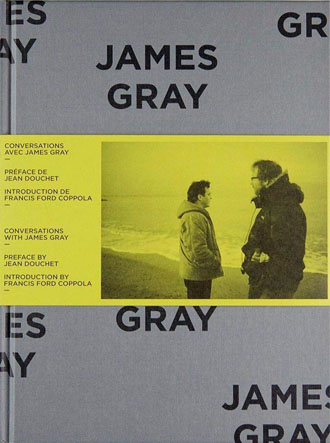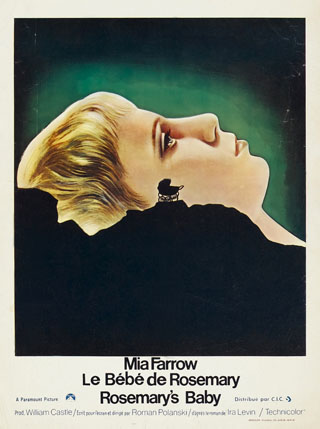In MUBI’s Notebook, where Daniel Kasman has filed a first dispatch from the Viennale, Adam Cook reviews Conversations with James Gray, a collection edited by Jordan Mintzer, the first of “what will hopefully be a considerable series of various critical writings on James Gray—especially when the director in question is one of the most articulate around and additionally one of the most open to discussing his own work.” The book also happens to be “just about the most gorgeously designed film monograph I’ve come across.”
More reading. Jim Emerson has had enough of all this cinema-is-dead nonsense: “Does it really matter so much which format has more cultural currency at any given point in time—big-screen projections in large auditoria or HD presentations in homes? So what if television formats have eclipsed feature filmmaking in the popular imagination at this particular moment in history? Isn’t that just what happens as times and tastes change, art forms evolve, technologies mutate? Maybe the old categories of ‘film’ and ‘television’ are no longer so distinct. Maybe they’re blending together into new forms that aren’t differentiated by shape, size and length—two-hour continuous blocks versus one-hour installments spread out at regular intervals over weeks and months. Now we can watch movies and TV series as if we were reading books—all at once or in shorter sittings, and we determine when and how and for how long we want to do it.”
At Press Play, Calum Marsh takes a look at “eight films which, at the time of release, received vicious reviews but have, in the years following, become lauded as great works, in one way or another.” He explores “how and why their reputations were rescued—as well as why their reputations were abysmal in the first place.”
Jonathan Rosenbaum‘s posted his 1974 review of Laura Mulvey and Peter Wollen’s Penthesilea: Queen of the Amazon (1974).
DVD/Blu-ray. At Movie Morlocks, R. Emmet Sweeney reviews four releases from the Warner Archive, starting with Nicholas Ray’s Born to Be Bad (1950), “a devious noir/woman’s picture in which Joan Fontaine uses her seductive wiles to marry the heir to a family fortune. Then there is a trio of manly ne’er do wells, with Peter Graves leading a mercenary force in the spaghetti western The Five Man Army (1969), Robert Mitchum doing the same in a priest’s habit in The Wrath of God (1972), and Rod Taylor carousing his way through Dublin in Young Cassidy (1965).”
Ed Park for Criterion on Rosemary’s Baby (1968): “A box-office smash in tune with both the domestic vernacular and the darker elements of the counterculture—occultist Aleister Crowley was on the cover of the Beatles’ Sgt. Pepper’s Lonely Hearts Club Band the year before—it paved the way for other satanically tinged blockbusters, in particular The Exorcist (1973) and The Omen (1976)…. But Polanski’s carefully orchestrated ambiguities make it an effective psychological thriller beyond—or despite—its inexorable demon-spawn plot.”
In the works. Joe Swanberg, Amy Seimetz, Kentucker Audley, A.J. Bowen, and Gene Jones have joined the cast of Ti West’s The Sacrament, a horror thriller currently shooting in Savannah, Georgia, reports Benjamin Wright at the Playlist.
Spiegel Online reports that Sönke Wortmann, a producer and director who’s scored a few mainstream hits in Germany, will direct an adaptation of Charlotte Roche’s erotic bestseller Wetlands. “It would be difficult to exaggerate the extent of this pop phenomenon in its initial, German incarnation,” wrote Justin E.H. Smith in n+1 in 2009. “In the spring of 2008 the book spent seven weeks at the top of Germany’s bestsellers list, and by May it had reached number one on Amazon’s international sales list, one of the rare books in German to enjoy this distinction. The chatter on the talk-shows was incessant, as everyone tried to figure out, or pretended to try to figure out, whether this was a work of erotic literature or of craftily marketed pornography. This pseudodebate was the engine of sales, and Roche knew just how to rev it. ‘[W]hen people ask me whether it’s pornography,’ she revealed in one interview, ‘I always say, “It depends who’s asking.” If it’s a man, I say, “It’s pornography.”‘”
For news and tips throughout the day every day, follow @KeyframeDaily on Twitter and/or the RSS feed. Get Keyframe Daily in your inbox by signing in at fandor.com/daily.





